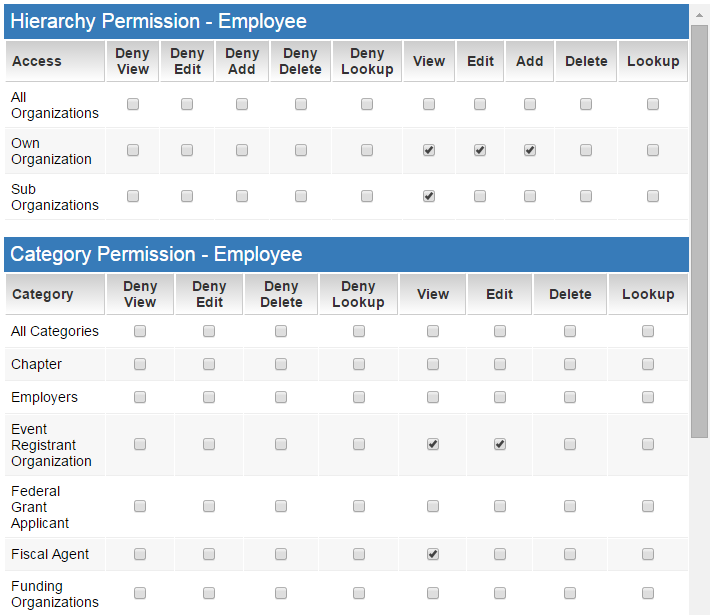Company and User Security Matrix
From SmartWiki
Revision as of 16:52, 16 December 2015 by Alvin Thompson (talk | contribs) (Created page with "{{UnderConstruction}} {| class="wikitable" |- |link= |This article will explain '''how''' you can implement this feature for use on your SmartSimple sy...")

|
This article will explain how you can implement this feature for
use on your SmartSimple system. |
Contents
Overview
Enabling the Company and User Matrix
- In the Configuration menu, Click on Global Settings
- Under the Security Tab, add a check mark to the box Enable Company and User Security Matrix
- Click Save
Configuring the User Security Matrix
- In the Configuration menu, click on Global Settings
- Under the Security Tab, click on the User Security Matrix
- Under the Login User Role select the user role you will be permissioning
- First set Hierarchy Permissions if applicable - This sets what general permissions a specific user role has to view and modify Users Under All Organizations, Users Under their Own Organization, and Users Under Sub Organizations.
- Set Category Permissions if applicable - This sets the granular category-by-category permissions to perform views, edits, deletes, and lookups.
Configuring the Company Security Matrix
- In the Configuration menu, click on Global Settings
- Under the Security Tab, click on the Company Security MatrixThis defines how users can interact with company data
- Under the Login User Role is displayed a list of all defined user roles. Select the user role you will be permissioning
- Set appropriate Hierarchy Permissions if applicable - This sets what general permissions a specific user role has to view and modify organization data that they belong to.
- Options include the ability to view, edit, add, delete, and lookup permissions for All Organizations, their Own Organizations, and their Sub Organizations.
- By adding a check mark to the specific check box in the matrix you will be enabling that permission for the specified user role.
- Set Category Permissions if applicable - This sets granular category-by-category permissions to perform views, edits, deletes, and lookups.
Permission Types
The following six permission types are available:
- Deny - Users in this role are denied access to this item.
- View – View the item.
- Add – Create a new item.
- Edit – Edit an existing item.
- Delete – Delete an existing item.
- Lookup – Search an existing item.
Company Security Matrix Example
1. Review the Hierarchy Permission and Category Permission shown below for the Employee Role:
- A. From the Hierarchy Permissions - Employees can View, Edit, and Add data related to their Own Organization.
- B. From the Category Permissions - Employees can View and Edit "Event Registrant Organization" and View "Fiscal Agents".
Notes - What are the limitations/restrictions if any?
Also See

|
Click here to learn why this feature is a benefit to yourorganization. |
